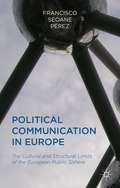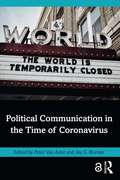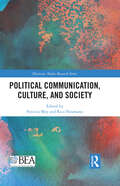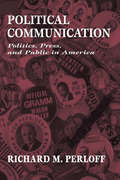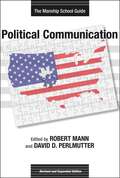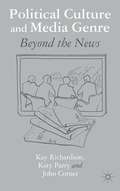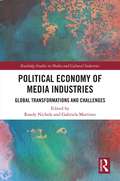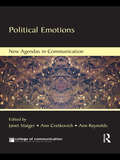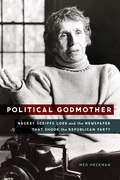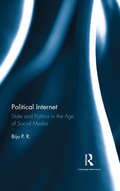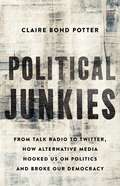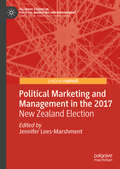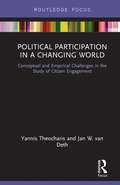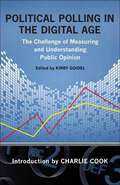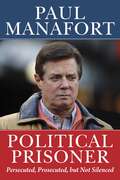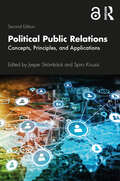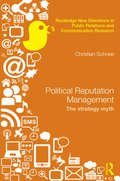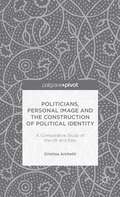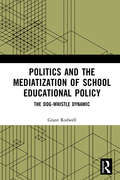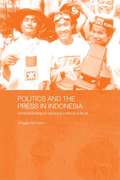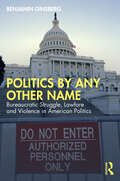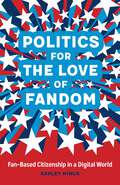- Table View
- List View
Political Communication in Europe: The Cultural and Structural Limits of the European Public Sphere
by Francisco Seoane PérezThe disconnection between the institutions of the EU and the people of Europe has often been attributed to the existence of a communication gap resulting from the failure of national medias and politicians to convey the importance of the EU. This book challenges that idea instead showing that the fault lies with the idea and institutions of the EU.
Political Communication in Postmodern Democracy
by Katrin Voltmer Kees BrantsThis book explores the changing relationship between politics, the media and citizens. Based on comparative evidence from the UK and the Netherlands it provides new insights into the dynamics of political communication in post-modern democracy, which is characterized by uncertainty about the location of politics and an erosion of grand narratives and political ideologies. The contributions of this volume aim to understand these changes as a two-dimensional process: the horizontal dimension encompasses the shifting power balance between politicians and the media. The vertical dimension explores how new forms of citizenship and the pervasiveness of popular culture alongside new communication technologies are challenging the authority of both established journalism and institutionalized politics. What emerges is a complex picture of politicization and de-politicization, elite dominance and the power of vox populi, mediatisation and effective control of political elites over the public agenda.
Political Communication in the Time of Coronavirus
by Peter Van AelstThis book examines how the COVID-19 pandemic impacted the flows of communication between politicians, journalists, and citizens. Distinguished contributors grapple with how the pandemic, as a global unexpected event, disrupted the communication process and changed the relationships between politics, media, and publics, the three central players of political communication. Using different methodologies, they scrutinize changes in government communication, (new) media coverage, and public opinion during this crisis. The book moves beyond the USA and Western Europe to include cases from Eastern Europe, Latin America, and Asia, taking into account how variations in the political context, the media system and personal leadership can influence how the COVID-19 pandemic challenged the political communication process. It is an ideal text for advanced students and scholars of political communication, political science, and media studies.
Political Communication, Culture, and Society (Electronic Media Research Series)
by Patricia Moy Rico NeumannAs an installment of Routledge’s Broadcast Education Association (BEA) Electronic Media Research Series, Political Communication, Culture, and Society focuses on the expansive concept of political communication and illuminates the processes, contents, and effects related to myriad forms and vehicles of political communication. Whether involving traditional print or broadcast media, social media platforms, or face-to-face discussions, political communication today has shaped how we perceive others and understand the world around us, including our place in it, and ultimately, how we engage with others as social, cultural, and political beings.Hailing from multiple locations and drawing on a multitude of theories as well as quantitative and qualitative methodologies, the volume’s contributors examine how communication intersects with politics in a broad swath of contexts, ranging from climate change to migration to the notion of political correctness. Collectively they ask and answer questions about how today’s richly textured media ecology shapes our political world and how political messages can fuel – and ameliorate – the issues that deeply cleave societies around the globe.Relevant to scholars and students of journalism, media studies, and communication sciences, this volume will help interested readers better understand today’s increasingly complex sociocultural world through the lens of political communication.
Political Communication: Politics, Press, and Public in America (Routledge Communication Series)
by Richard M. PerloffIn this political communication text, Richard M. Perloff examines the various ways in which messages are constructed and communicated from public officials and politicians through the mass media to the ultimate receivers-the people. With a focus on the history of political communication, he provides an overview of the most significant issues in the study of politics and the media. In addition to synthesizing facts and theories, and highlighting the scholarly contributions made to the understanding of political communication effects, Political Communication addresses such factors as the rhetorical accomplishments of American presidents, the ongoing tangles between the press and the presidency, and the historical roots of politics as it is practiced and studied today. It also addresses major issues about the press and politics that continually resurface, such as question of press bias and the use and manipulation of media by politicians to accomplish national goals. As a comprehensive and engaging introduction to contemporary political communication, this volume provides all readers with a historical perspective on American politics and press and offers a unique appreciation of the strengths and virtues of political communication in America.
Political Communication: The Manship School Guide (Media & Public Affairs #7)
by Robert Mann David Schultz David D. Perlmutter Wayne Parent Kirby Goidel Charlie Cook Monica Ancu Robert H. Binstock Louis Day Thomas Edmonds Malcom P. Ehrhardt William B. Fletcher John Franzen Ronald Garay Paul Harang Bud Jackson Lynda L. Kaid Katie Knobloch David D. Kurpius Lisa Lundy Melissa Michelson Trevor Parry-Giles Sean Reilly Dane Strother Gerry Tyson Darrell West Michael XenosA new era of political power has arrived, one in which the social media forces of Facebook, YouTube, and Twitter indisputably play a larger role in the political process. In this revised and expanded edition of Political Communication: The Manship School Guide, edited by Robert Mann and David D. Perlmutter, contributors discuss technological changes in the context of studies and techniques that remain unchallenged, resulting in a truly comprehensive manual of the world of political communication. This shift in communication began with Howard Dean's social media interaction between voters and candidates. Later, Barack Obama redefined these techniques during his march to the White House. This intriguing development in political campaigns focuses the impact of social media on political consultation and communication, and this volume provides an up-to-date and peerless guide to the events, methods, technologies, venues, theories, and applications of political dialogues.More than just a how-to primer, this new edition also expertly explains the process behind the political engine. Political Communication: The Manship School Guide includes individual essays that tackle the growing myths revolving around politics, such as the political money-monster and the "Mr. Smith Goes to Washington"--candidate fantasy.Twenty-seven chapters from a variety of contributors -- including academics, journalists, and political professionals -- provide insightful, astute, and critical essays for a deeper understanding of political communication and the many roles the public has played in twenty-first-century politics.With this second edition, Political Communication: The Manship School Guide offers readers a valuable resource that clarifies the confusing world of politics.
Political Culture and Media Genre
by John Corner Kay Richardson Katy ParryExploring the forms and meanings of mediated politics beyond the news cycle, this book encompasses genres drawn from television, radio, the press and the internet, assessing their individual and collective contribution to contemporary political culture through textual analysis and thematic review.
Political Economy of Media Industries: Global Transformations and Challenges (Routledge Studies in Media and Cultural Industries)
by Randy Nichols Gabriela MartinezThis book provides a critical political economic examination of the impact of increasingly concentrated global media industries. It addresses different media and communication industries from around the globe, including film, television, music, journalism, telecommunication, and information industries. The authors use case studies to examine how changing methods of production and distribution are impacting a variety of issues including globalization, environmental devastation, and the shifting role of the State. This collection finds communication at a historical moment in which capitalist control of media and communication is the default status and, so, because of the increasing levels of concentration globally allows those in control to define the default ideological status. In turn, these concentrated media forces are deployed under the guise of entertainment but with a mind towards further concentration and control of the media apparatuses many times in convergence with others
Political Emotions (New Agendas in Communication Series)
by Janet StaigerPolitical Emotions explores the contributions that the study of discourses, rhetoric, and framing of emotion make to understanding the public sphere, civil society and the political realm. Tackling critiques on the opposition of the public and private spheres, chapters in this volume examine why some sentiments are valued in public communication while others are judged irrelevant, and consider how sentiments mobilize political trajectories. Emerging from the work of the Public Feelings research group at the University of Texas-Austin, and cohering in a New Agendas in Communication symposium, this volume brings together the work of young scholars from various areas of study, including sociology, gender studies, anthropology, art, and new media. The essays in this collection formulate new ways of thinking about the relations among the emotional, the cultural, and the political. Contributors recraft familiar ways of doing critical work, and bring forward new analyses of emotions in politics. Their work expands understanding of the role of emotion in the political realm, and will be influential in political communication, political science, sociology, and visual and cultural studies.
Political Godmother: Nackey Scripps Loeb and the Newspaper That Shook the Republican Party
by Meg HeckmanNewspaper publisher and GOP kingmaker Nackey Scripps Loeb headed the Union Leader Corporation, one of the most unusual—and influential—local newspaper companies in the United States. Her unapologetic conservatism and powerful perch in the home of the first-in-the-nation presidential primary elicited fear and respect while her leadership of New Hampshire&’s Union Leader gave her an outsized role in American politics. In Political Godmother Meg Heckman looks at Loeb&’s rough-and-tumble political life against the backdrop of the right-wing media landscape of the late twentieth century. Heckman reveals Loeb as a force of nature, more than willing to wield her tremendous clout and able to convince the likes of Pat Buchanan to challenge a sitting president. Although Loeb initially had no interest in the newspaper business, she eventually penned more than a thousand front-page editorials, drew political cartoons, and became a regular on C-SPAN. A fascinating look at power politics in action, Political Godmother reveals how one woman ignited conservatism&’s transformation of the contemporary Republican Party.
Political Internet: State and Politics in the Age of Social Media
by Biju P. R.This book investigates the Internet as a site of political contestation in the Indian context. It widens the scope of the public sphere to social media, and explores its role in shaping the resistance and protest movements on the ground. The volume also explores the role of the Internet, a global technology, in framing debates on the idea of the nation state, especially India, as well as diplomacy and international relations. It also discusses the possibility of whether Internet can be used as a tool for social justice and change, particularly by the underprivileged, to go beyond caste, class, gender and other oppressive social structures. A tract for our times, this book will interest scholars and researchers of politics, media studies, popular culture, sociology, international relations as well as the general reader.
Political Journalism in Comparative Perspective
by Erik Albæk Arjen van Dalen Nael Jebril Claes H. de Vreese Erik Albæk Arjen Van Dalen Nael Jebril Claes H. de VreesePolitical journalism is often under fire. Conventional wisdom and much scholarly research suggest that journalists are cynics and political pundits. Political news is void of substance and overly focused on strategy and persons. Citizens do not learn from the news, are politically cynical, and are dissatisfied with the media. This book challenges these assumptions, which are often based on single-country studies with limited empirical observations about the relation between news production, content, and journalism's effects. Based on interviews with journalists, a systematic content analysis of political news, and panel survey data in different countries, this book tests how different systems and media-politics relations condition the contents of political news. It shows how different content creates different effects, and demonstrates that under the right circumstances citizens learn from political news, do not become cynical, and are satisfied with political journalism.
Political Junkies: From Talk Radio to Twitter, How Alternative Media Hooked Us on Politics and Broke Our Democracy
by Claire Bond PotterA wide-ranging history of seventy years of change in political media, and how it transformed -- and fractured -- American politicsWith fake news on Facebook, trolls on Twitter, and viral outrage everywhere, it's easy to believe that the internet changed politics entirely. In Political Junkies, historian Claire Bond Potter shows otherwise, revealing the roots of today's dysfunction by situating online politics in a longer history of alternative political media. From independent newsletters in the 1950s to talk radio in the 1970s to cable television in the 1980s, pioneers on the left and right developed alternative media outlets that made politics more popular, and ultimately, more partisan. When campaign operatives took up e-mail, blogging, and social media, they only supercharged these trends. At a time when political engagement has never been greater and trust has never been lower, Political Junkies is essential reading for understanding how we got here.
Political Marketing and Management in the 2017 New Zealand Election (Palgrave Studies in Political Marketing and Management)
by Jennifer Lees-MarshmentThis book reveals the market research, strategy, branding and communication behind the unpredictable 2017 New Zealand election result which saw Jacinda Ardern elected Labour leader just 8 weeks before the election to become Prime Minister. Utilising rich data sources that include a 250,000 Vote Compass survey and interviews with key political advisors, it explores the alignment of the policy of National, Labour, the Greens and NZ First with party supporters, demographic segments and undecided voters. It also analyses the leadership communication and branding of the leaders Bill English, Jacinda Ardern and Andrew Little, as well as the advertising by minor parties ACT, the Greens, United Future and the Maori Party. The book provides advice for practitioners, such as: focus on being responsive, communicate delivery competence, differentiate in policy and advertising, build an energetic and charismatic leader brand and be flexible when planning.
Political Participation in a Changing World: Conceptual and Empirical Challenges in the Study of Citizen Engagement
by Jan W. van Deth Yannis TheocharisIn the last decades, political participation expanded continuously. This expansion includes activities as diverse as voting, tweeting, signing petitions, changing your social media profile, demonstrating, boycotting products, joining flash mobs, attending meetings, throwing seedbombs, and donating money. But if political participation is so diverse, how do we recognize participation when we see it? Despite the growing interest in new forms of citizen engagement in politics, there is virtually no systematic research investigating what these new and emerging forms of engagement look like, how prevalent they are in various societies, and how they fit within the broader structure of well-known participatory acts conceptually and empirically. The rapid spread of internet-based activities especially underlines the urgency to deal with such challenges. In this book, Yannis Theocharis and Jan W. van Deth put forward a systematic and unified approach to explore political participation and offer new conceptual and empirical tools with which to study it. Political Participation in a Changing World will assist both scholars and students of political behaviour to systematically study new forms of political participation without losing track of more conventional political activities.
Political Polling in the Digital Age: The Challenge of Measuring and Understanding Public Opinion (Media & Public Affairs)
by Susan Herbst Mark Blumenthal Kirby Goidel Charlie Cook Scott Keeter Anna Greenberg Charles FranklinThe 2008 presidential election provided a "perfect storm" for pollsters. A significant portion of the population had exchanged their landlines for cellphones, which made them harder to survey. Additionally, a potential Bradley effect -- in which white voters misrepresent their intentions of voting for or against a black candidate -- skewed predictions, and aggressive voter registration and mobilization campaigns by Barack Obama combined to challenge conventional understandings about how to measure and report public preferences. In the wake of these significant changes, Political Polling in the Digital Age, edited by Kirby Goidel, offers timely and insightful interpretations of the impact these trends will have on polling.In this groundbreaking collection, contributors place recent developments in public-opinion polling into a broader historical context, examine how to construct accurate meanings from public-opinion surveys, and analyze the future of public-opinion polling. Notable contributors include Mark Blumenthal, editor and publisher of Pollster.com; Anna Greenberg, a leading Democratic pollster; and Scott Keeter, director of survey research for the Pew Research Center.In an era of increasingly personalized and interactive communications, accurate political polling is more difficult and also more important. Political Polling in the Digital Age presents fresh perspectives and relevant tactics that demystify the variable world of opinion taking.
Political Prisoner: Persecuted, Prosecuted, but Not Silenced
by Paul ManafortNEW BOOK CLAIMS DONALD TRUMP WILL RUN AND WIN IN 2024!A riveting account of the HOAX that sent a presidential campaign chairman to solitary confinement because he wouldn&’t turn against the President of the United States. The chief weapon deployed by the government-corporate-media Establishment against the Trump presidency was propaganda. Time and again, allegations from anonymous sources were disseminated by a partisan media, promoted by a dishonest Democrat Party leadership, and ultimately debunked when the facts surfaced. But by the time the truth came out, it was too late. There had already been casualties. One of the highest profile casualties was Paul Manafort. Desperate to defeat Donald Trump—or hamper his presidency after he won—Democrats and their Establishment allies colluded with foreign operatives to concoct a completely false narrative about Paul&’s supposed conspiracy with pro-Russian elements in Ukraine to further Vladimir Putin&’s efforts to influence the 2016 presidential election. But it wasn&’t just defamation of Paul&’s character. They took the unprecedented step of enlisting the US intelligence and law enforcement communities in using their power against President Trump and his campaign team. Political Prisoner finally exposes the lies left unchallenged by media who pronounced Paul guilty long before his case ever saw the inside of a courtroom. Not only is it untrue that Victor Yanukovych or any of Paul&’s clients were &“pro-Putin,&” it is the opposite of the truth. Paul&’s work in Ukraine and throughout his career was 100 percent aligned with US interests in the countries he worked in, sometimes even acting as a back channel for the White House itself. Neither was Paul guilty of laundering money, evading taxes, or deliberately deceiving the US government by failing to register as a foreign agent—which he wasn&’t. These were all politically motivated charges manufactured by the Special Counsel&’s team for one reason and one reason only: to get Paul to testify against Donald Trump about a conspiracy that never existed. When they hear the basis of these spurious charges, Americans will wonder what country they are living in and what has happened to our system of justice. Political Prisoner tells the real story of Paul&’s life and career, exploding the lies about his work in Ukraine, his previous work with foreign governments and business interests in other countries, his involvement with the Trump campaign, and the &“process crimes&” for which he was wrongly convicted and sent to prison. It is no exaggeration to say that everything most Americans think they know about Paul Manafort is false.
Political Public Relations: Concepts, Principles, and Applications (Routledge Communication Series)
by Jesper Stromback Spiro KiousisThe second edition of Political Public Relations offers an interdisciplinary overview of the latest theory and research in the still emerging field of political public relations. The book continues its international orientation in order to fully contextualize the field amidst the various political and communication systems today. Existing chapters have been updated and new chapters added to reflect evolving trends such as the rise of digital and social media, increasing political polarization, and the growth of political populism. As a singular contribution to scholarship in public relations and political communication, this volume serves as an important catalyst for future theory and research. This volume is ideal for researchers and courses at the intersection of public relations, political communication, and political science.
Political Reputation Management: The Strategy Myth (Routledge New Directions in PR & Communication Research)
by Christian SchneeIt is widely assumed that a competitive political environment of public distrust and critical media forces political parties to manage communications and reputations strategically, but is this really true? Comprehensive control of communications in a fast-moving political and media setting isoften upset by events outside the communicator’s control, taking over the news agenda andchanging the political narrative. Based on interviews with leading communicators and journalists, this book explores the tensions between a planned, strategic communications approach and a reactive, tactical one. The interviewees, who over the past 15 years have been instrumental in presenting and shaping the public persona of party leaders and Prime Ministers, include, amongst others, William Hague, Ian Duncan-Smith, Michael Howard, David Cameron, Tony Blair and Gordon Brown.It draws a unique picture of how political reputations are managed and, ultimately, confirms the discrepancy between what political communications management is thought to be, and how communications practitioners actually operate. This book empirically reviews political communications practice in order to analyse to what degree reality matches the concepts of strategic communications management. This will be essential reading for researchers, educators and advanced students in public relations, communications studies and marketing.
Politicians, Personal Image and the Construction of Political Identity: A Comparative Study of the UK and Italy
by Cristina ArchettiIs the media obsession with image leading to a degeneration of politics? Are politicians more concerned with their appearances than with policy substance? Through the evidence provided by over 50 interviews with politicians across the UK and Italy - local councillors, MPs and MEPs - this book provides a very different picture of the world of politics than the one we often cynically imagine. By relying on extensive excerpts from frank and colorful conversations with the interviewees, the analysis develops a new multidisciplinary model to understand the 'mediatization' of politics and the way the personal image of elected representatives is constructed in the age of interconnectedness.
Politics and the Mediatization of School Educational Policy: The Dog-Whistle Dynamic
by Grant RodwellDespite increasing prevalence over the past three decades and a clear impact on school education policy and practice, education’s connection to dog-whistle journalism and politics has not yet been fully explored. Addressing this gap, Politics and the Mediatization of School Educational Policy examines the emergence and current impact of dog-whistle politics and journalism on education in Australia, the US and the UK, questioning what is at stake when this political dog whistle is directed at school educational policy and practice. Exploring common targets for dog-whistling, such as teaching standards, teacher quality and specific curriculum areas, such as history, sex and health education, the book considers the broader social issues of xenophobia and racism, as well as the decline of print media and rise of digital news sources in its place, with each chapter including an in-depth discussion using peer-reviewed literature on the subject. Following the trail of dog whistles impacting in school educational policy and practice across these three countries, this book explores: To what extent is the dog-whistle dynamic embedded in school educational policy and practice? To what extent does the dog-whistle dynamic affect our understanding of school educational policy and practice? How might we explain the continued flurry of dog whistles impacting school educational policy and practice? As the phenomenon of the dog whistle intensifies both nationally and internationally, this timely and thought-provoking book is necessary reading for academics, postgraduate researchers and all members of school communities.
Politics and the Press in Indonesia: Understanding an Evolving Political Culture
by Angela RomanoThis book explores the evolving political culture in Indonesia, by discussing the country's dominant political philosophies, then showing how those philosophies affect the working lives of ordinary Indonesian citizens. It focuses in particular on the working lives of news journalists, a group that occupies a strategic social and political position.
Politics by Any Other Name: Bureaucratic Struggle, Lawfare and Violence in American Politics
by Benjamin GinsbergThis book critiques a modern U.S. political system characterized by the partisan weaponization of bureaucratic systems and institutions.Competition for political power in the United States today is not just about winning elections. Competing political forces attempt to win at the polls, but they do not bet all their chips on electoral outcomes. Each party has built an institutional bastion within portions of the federal bureaucracy. Each party makes use of judicial and criminal proceedings for partisan purposes—a practice dubbed “lawfare” by the national media. And, acting through various surrogates, each party sponsors “violence by proxy,” to achieve its ends. To the extent that political struggles are fought outside the electoral arena, ordinary Americans have little or no voice in public affairs. And, unfortunately, in the United States today, a good deal of political struggle takes place outside the electoral arena.This book will be used in undergraduate and graduate classes in political parties, electoral politics, and in general U.S. government classes.
Politics for the Love of Fandom: Fan-Based Citizenship in a Digital World
by Ashley HinckPolitics for the Love of Fandom examines what Ashley Hinck calls “fan-based citizenship”: civic action that blends with and arises from participation in fandom and commitment to a fan-object. Examining cases like Harry Potter fans fighting for fair trade, YouTube fans donating money to charity, and football fans volunteering to mentor local youth, Hinck argues that fan-based citizenship has created new civic practices wherein popular culture may play as large a role in generating social action as traditional political institutions such as the Democratic Party or the Catholic Church. In an increasingly digital world, individuals can easily move among many institutions and groups. They can choose from more people and organizations than ever to inspire their civic actions—even the fandom for children's book series Harry Potter can become a foundation for involvement in political life and social activism. Hinck explores this new kind of engagement and its implications for politics and citizenships, through case studies that encompass fandoms for sports, YouTube channels, movies, and even toys. She considers the ways in which fan-based social engagement arises organically, from fan communities seeking to change their world as a group, as well as the methods creators use to leverage their fans to take social action. The modern shift to networked, fluid communities, Hinck argues, opens up opportunities for public participation that occurs outside of political parties, houses of worship, and organizations for social action. Fan-based citizenship performances help us understand the future possibilities of public engagement, as fans and creators alike tie the ethical frameworks of fan-objects to desired social goal, such as volunteering for political candidates, mentoring at-risk youth, and promoting environmentally friendly policy. Politics for the Love of Fandom examines the communication at the center of these civic actions, exploring how fans, nonprofits, and media companies manage to connect internet-based fandom with public issues.
Politics without Stories
by David RicciLiberal candidates, scholars, and activists mainly promote pragmatism rather than large and powerful narratives - which may be called 'alpha stories' for their commanding presence over time. Alternatively, conservative counterparts to such liberals tend to promote their policy preferences in alpha stories praising effective markets, excellent traditions, and limited government. In this face-off, liberals represent a post-Enlightenment world where many modern people, following Max Weber, are 'disenchanted', while many conservatives, echoing Edmund Burke, cherish stories borrowed from the past. Politics without Stories describes this storytelling gap as an electoral disadvantage for liberals because their campaigning lacks, and will continue to lack, the inspiration and shared commitments that great, long-term stories can provide. Therefore, Ricci argues that, for tactical purposes, liberals should concede their post-Enlightenment skepticism and rally around short-term stories designed to frame, in political campaigns, immediate situations which they regard as intolerable. These may help liberals win elections and influence the course of modern life.
